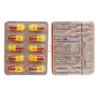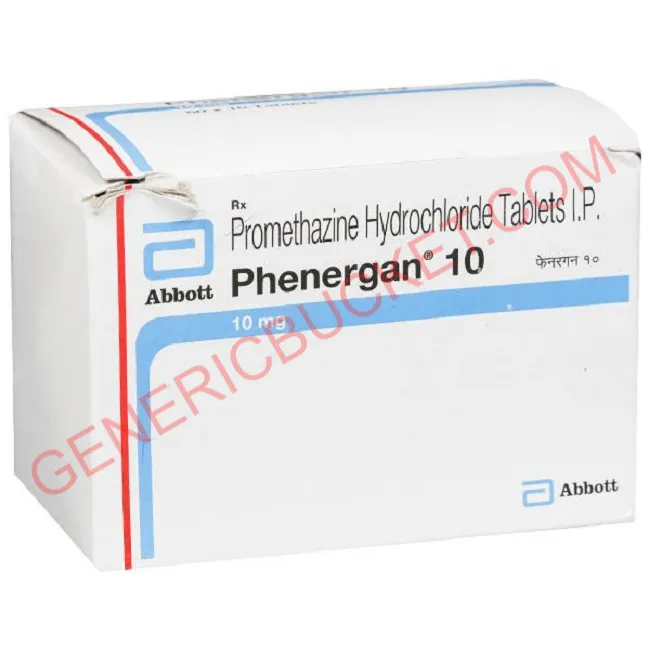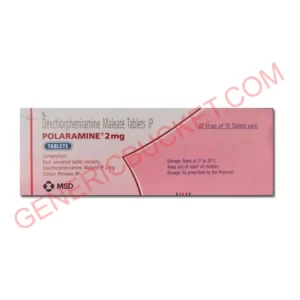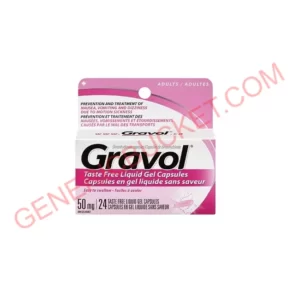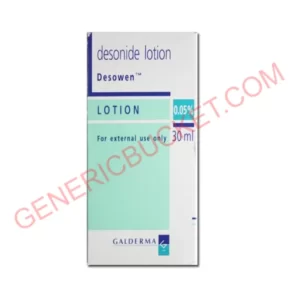Phenergan 10 Tablet (Promethazine 10mg)
$25.00 – $60.00Price range: $25.00 through $60.00
| Country of Origin | india |
|---|---|
| Dosage Form | Tablets |
| Generic Name | Promethazine |
| Indication | Nausea and vomiting due to chemotherapy |
| Manufacturer | Abbott India Pvt Ltd |
| Packaging | 10 tablets in 1 strip |
| Composition | Promethazine (10mg) |
| Phenergan 10 Tablet (Promethazine 10mg) | |||
| Pack Size | Price | Price/Unit | Add To Cart |
| 100 Tablet/s | $25.00 (0.25/unit) | $0.25 | |
| 200 Tablet/s | $44.00 (0.22/unit) | $0.22 | |
| 300 Tablet/s | $60.00 (0.2/unit) | $0.2 | |
INTRODUCTION
PHENERGAN 10MG contains Promethazine which belongs to the group of medicines called Antihistamines. It is used to induce sleep in adults suffering from insomnia (difficulty in falling asleep) and in children aged 5 years or older. It can also be used to treat allergic reactions such as hay fever or skin rashes. It also helps to stop nausea and vomiting caused due to travelling (travel sickness).
Promethazine is an antihistamine with sedative properties. It acts by blocking the release of certain chemicals (histamines) in the body that causes allergic reactions and vomiting. It can also directly act on the brain and help you feel relaxed and calm.
Before taking PHENERGAN 10MG, inform your doctor if you have any liver, kidney, or heart problems. You must also inform your doctor if you have asthma, or other breathing problems, glaucoma, epilepsy, hearing problems or blockage in the gut before taking PHENERGAN 10MG as a precaution.
Talk to your doctor before taking PHENERGAN 10MG if you are already taking any medicines for depression. Avoid consumption of alcohol while taking PHENERGAN 10MG as it may reduce its effectiveness. Consult your doctor before taking PHENERGAN 10MG if you are pregnant or breastfeeding.
PHENERGAN 10MG may cause excessive sleepiness or drowsiness. Therefore, avoid driving or operating any heavy tools or performing activities that requires complete attention. Other most common side effects of taking PHENERGAN 10MG are dry mouth, blurred vision, headache, tiredness, skin sensitivity, dizziness, and indigestion. Contact your doctor if any of these side effect worsens.
Talk to your doctor if you cannot see any improvement in your condition even after using PHENERGAN 10MG for the specific period prescribed for you.
USES OF PHENERGAN 10MG
It is used as a short-term therapy to:
- Treat insomnia (difficulty in falling asleep) in adults
- Treat allergic conditions (such as hay fever or skin rashes)
- Treat nausea and vomiting caused due to travel (travel sickness)
- Induce sleep (sleeping aid) in children aged 5 years or older
HOW PHENERGAN 10MG WORKS
PHENERGAN 10MG is an antihistamine with anti-emetic and sedative properties. It acts by blocking the release of certain chemicals (histamines) in the body that causes allergic reactions and vomiting. It can also directly act on the brain and induce sleep by blocking the actions of certain chemical messengers (acetylcholine, glutamate, and dopamine) that hinders sleep and keeps you awake.
DIRECTIONS FOR USE
Take PHENERGAN 10MG as advised by your physician. Swallow the medicine with a glass of water. Do not crush or chew the medicine.
Your doctor will decide the correct dose and duration of therapy for you depending upon your age, body weight and disease condition.
Continue to take PHENERGAN 10MG for the stipulated duration prescribed by your doctor to achieve better results.
SIDE EFFECTS OF PHENERGAN 10MG
COMMON
- Dry mouth
- Blurred vision
- Difficulty in passing urine
- Feeling tired, sleepy, dizzy, drowsy, or faint
- Headache, sleep problems
- Loss of appetite, indigestion
- Feeling confused, especially in elderly people
- Increased skin sensitivity towards sun
- Urge to move your legs frequently (Restless Legs Syndrome)
RARE
Stop taking PHENERGAN 10MG and contact your doctor immediately if you experience any of the following side effects:
- Signs of allergic reaction (such as skin rash, swallowing or breathing problems, swelling of the lips, face, throat, or tongue)
- Signs of liver problems (such as yellowing of the skin and eyes)
- Muscle stiffness or shaking
- Unable to control the muscles of the face or head, facial muscle spasms, rolling eyes and trembling
- Irregular or rapid heartbeat
- Anaemia symptoms such as tiredness
- Over-active behaviour in children
HOW TO MANAGE SIDE EFFECTS
Headache:
Rest and relax. Keep yourself hydrated by drinking plenty of fluids such as water or electrolytes. Applying a pain-relieving balm on your forehead can be beneficial. Do not consume excessive alcohol, as it could aggravate your headache. Consult your doctor if your headache worsens.
Feeling sleep, dizzy, or drowsy:
Try to rest and relax. Get enough sleep. Avoid driving or operating any heavy tools or machines completely while you are feeling sleepy or dizzy. Do not consume excessive alcohol. Consult your doctor if your condition worsens.
Dry mouth:
Drink plenty of water or fluids at regular intervals. Frequent small sips of water or the use of artificial saliva may be beneficial. However, if it bothers you or if your condition worsens contact your doctor.
WARNING & PRECAUTIONS
PREGNANCY
PHENERGAN 10MG should be used in pregnant women only if prescribed by the physician. However, it is not recommended for use in pregnant women during the last few weeks (2 weeks) of pregnancy. Therefore, consult your doctor before taking it.
BREASTFEEDING
PHENERGAN 10MG is generally not recommended for use in breastfeeding women as it may pass through the breast milk. Therefore, consult your doctor before taking it.
DRIVING AND USING MACHINES
Do not drive or operate any heavy tools or machines after taking PHENERGAN 10MG. This is because, PHENERGAN 10MG may cause excessive sleepiness or drowsiness which can hinder your abilities of driving or handling machines.
ALCOHOL
Avoid consumption of alcohol while taking PHENERGAN 10MG as it may reduce its effectiveness.
KIDNEY
PHENERGAN 10MG should be used with caution in patients with kidney problems. Therefore, consult your doctor before taking it.
LIVER
PHENERGAN 10MG should be used with caution in patients with liver problems. Therefore, consult your doctor before taking it.
ALLERGY
Do not take PHENERGAN 10MG if you are allergic to Promethazine.
LUNGS
PHENERGAN 10MG should be used with caution in patients with bronchitis (inflammation of the bronchus), asthma or other breathing difficulties. Therefore, consult your doctor before taking it.
HEART DISEASE
PHENERGAN 10MG should be used with caution in patients with any serious heart problems. Therefore, consult your doctor before taking it.
OTHERS
PHENERGAN 10MG is not recommended for use if you:
- Suffer from severe dizziness, drowsiness, or headache
- Are in unconscious or coma state
Before taking PHENERGAN 10MG, inform your doctor if you:
- Have epilepsy
- Have blockage in the gut
- Have difficulty in passing urine
- Have problems in hearing
- Have narrow angle glaucoma (increased pressure in the eye)
- Have or had Reye’s Syndrome (vomiting, tiredness and confusion following a viral infection) in the past
- Are going for a pregnancy test or skin test
Use in pediatrics:
PHENERGAN 10MG should be used in children and adolescents (aged 5 years or older) only if prescribed by the physician. It is not recommended for use in children aged below 5 years. Therefore, consult your doctor before taking it.
Use in geriatrics:
PHENERGAN 10MG should be used with caution in elderly patients (aged 65 years or above). Therefore, consult your doctor before taking it.
INTERACTIONS
A. Drug-Drug Interaction:
Before taking PHENERGAN 10MG, inform your doctor if you are taking any of the following:
- Medicines used to treat depression such as monoamine oxidase inhibitors (Ex. fluoxetine, selegiline, phenelzine, isocarboxazid)
- Anticholinergic medicines (used to improve heart rate, decrease muscle movements, and body secretions) Ex. atropine, dicyclomine
- Diazepam or zolpidem (used to induce sleep)
- Aspirin (a medicine used for pain relief or blood thinning)
Overdosage:
If you or anyone else accidentally took more PHENERGAN 10MG, consult your doctor immediately or visit the nearby hospital. Symptoms of overdose might include hyperactivity, unsteady movements, uncontrolled writhing movements especially of the hands or feet, hallucinations, fits, very fast or uneven heartbeat, breathing problems and excessive sleepiness or drowsiness.
Related Product
Related products
Allergy
Allergy
Allergy
Allergy
Allergy


